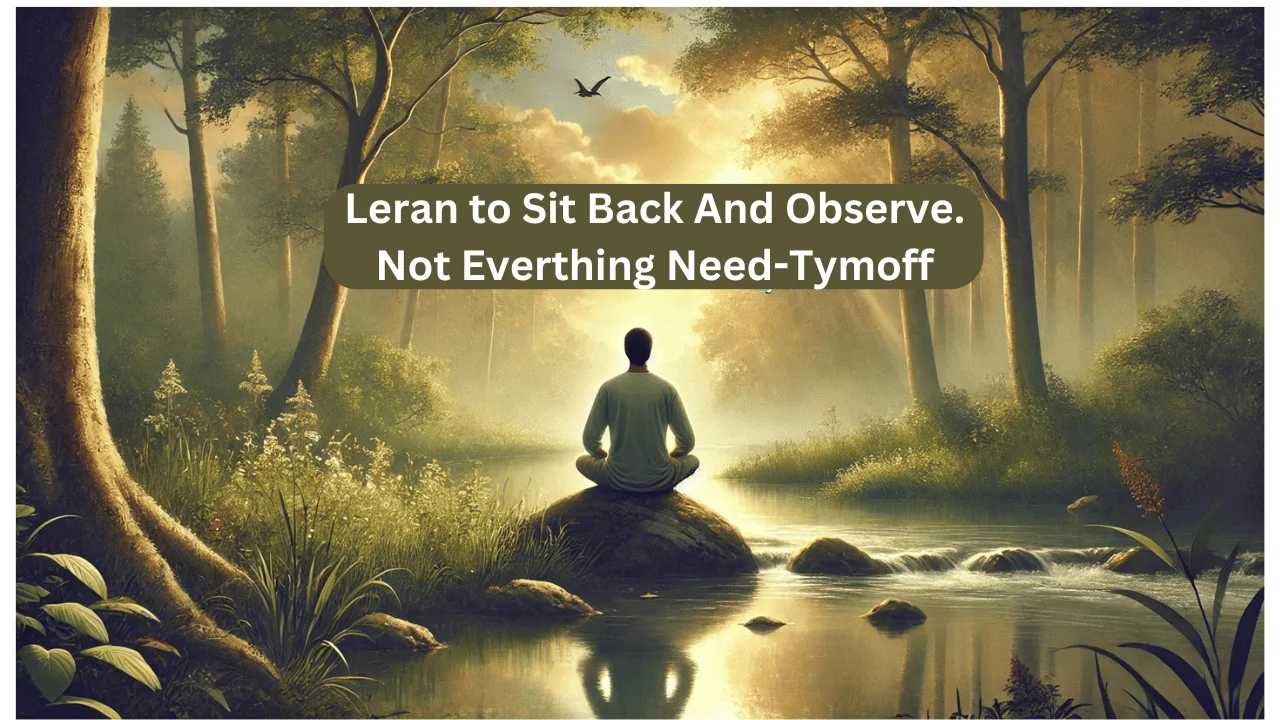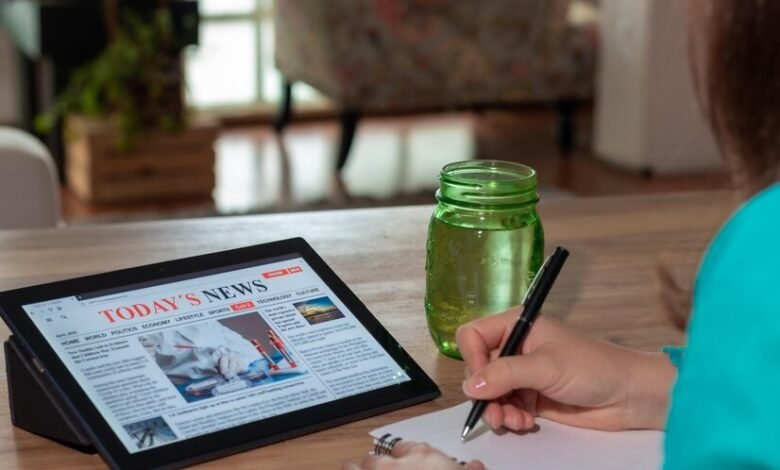Learn to sit back and observe. not everything need – tymoff In our fast-paced world, many people feel pressured to act immediately in every situation. However, there is a powerful lesson in learning to sit back and observe. Not everything requires a rush of response. Taking a moment to pause and assess can be a game changer. It helps clear your mind, making it easier to make thoughtful decisions. Sometimes, the best course of action is to simply wait.
Table of Contents
Learn to sit back and observe. not everything need – tymoff The idea of sitting back and observing may seem counterintuitive, especially when we’re conditioned to believe that action is always the answer. But often, when we pause, we gain valuable insights that we might miss in a rush. It is a skill worth developing, particularly in a world where speed and urgency often lead to stress. Learning to do nothing—at least for a moment—can actually enhance our effectiveness in the long run. Learn to sit back and observe. not everything need – tymoff
By learning to sit back and observe, you can avoid knee-jerk reactions that might lead to mistakes. Reflection gives you the clarity to approach situations with more patience and wisdom. Not everything needs an immediate response. Sometimes, taking a step back helps you make the best decision, whether it’s in a personal relationship, at work, or in a creative endeavor. It allows you to weigh your options thoroughly.
People often confuse stillness with passivity or indecisiveness, but this is a misconception. Observing is not about avoiding action; it’s about acting when the time is right. In fact, those who take the time to sit back and observe often make the most well-informed decisions. They can respond rather than react, a subtle yet powerful difference that can lead to greater success and peace of mind.
Ultimately, not everything requires an immediate response. Whether it’s a challenging situation or a simple decision, sitting back to observe gives you the space to reflect. It can lead to more thoughtful, measured actions that are better for you and the people around you. Taking time to pause and think is often the smartest move you can make.
The Importance of Patience: Learn to sit back and observe. not everything need – tymoff

Patience is often the key to solving problems effectively. Learn to sit back and observe. not everything need – tymoff When we feel rushed, we make decisions too quickly. This is where learning to sit back and observe comes in. By allowing yourself the space to reflect, you avoid acting impulsively. Instead, you give yourself time to think through your options.
In our society, impatience is often seen as a virtue. However, the pressure to act immediately can cause more harm than good. By taking the time to observe, we gain a clearer understanding of the situation. Learn to sit back and observe. not everything need – tymoff This patient approach leads to better decision-making, reducing the risk of mistakes caused by hasty reactions.
Patience also improves your emotional well-being. Learn to sit back and observe. not everything need – tymoff When we stop rushing, we experience less stress and anxiety. Sitting back and observing helps create a calm mindset. Instead of feeling overwhelmed by the need to act fast, we take things one step at a time. This gradual approach helps us maintain control over our emotions and responses.
People who cultivate patience often find that they are more successful in the long term. They have the ability to make more thoughtful decisions and solve problems more effectively. Patience allows them to see the bigger picture, which is something we often miss when we act too quickly. Not everything needs immediate action, and sometimes waiting leads to better outcomes.
Learning to be patient doesn’t mean you have to be inactive. It simply means taking the time to assess the situation before taking action. By practicing patience, you become more deliberate and intentional in your choices. Over time, this approach helps you lead a more balanced, less stressful life.
Observation as a Tool for Better Decision-Making

When you learn to sit back and observe, you give yourself the chance to make more informed decisions. Instead of reacting right away, you take time to gather all the facts. Learn to sit back and observe. not everything need – tymoff This method of decision-making is more thoughtful and thorough, leading to better outcomes.
Observation also allows you to notice things you might otherwise miss. It gives you the opportunity to understand the full scope of the situation before acting. Learn to sit back and observe. not everything need – tymoff Whether it’s reading body language in a conversation or analyzing data at work, observation lets you gather more information before making a decision.
Another benefit of observation is that it reduces the risk of regret. When we act too quickly, we often look back and wish we had considered other options. But by sitting back and observing, we make choices that are more in line with our goals and values. This helps minimize second-guessing and increases our confidence in our decisions.
Moreover, observation allows us to assess the reactions of others. By watching how people respond to different situations, we can learn from their experiences. This makes it easier to avoid common pitfalls and make smarter choices. Learning to sit back and observe, therefore, becomes an invaluable skill for personal growth.
In the end, the ability to observe before acting helps us to stay grounded. It keeps us from being swept away by the urgency of the moment. By taking time to reflect, we can make better decisions that align with our values and long-term goals. Not everything needs immediate action, and by observing first, we make more meaningful progress.
Reducing Stress: The Power of Sitting Back and Observing
Stress is one of the biggest challenges people face today. Constant pressure to perform and make decisions can feel overwhelming. One way to reduce stress is by learning to sit back and observe. By stepping away from the chaos and giving yourself time to think, you can manage your stress more effectively.
When we are constantly on the move, we are more likely to experience burnout. Learn to sit back and observe. not everything need – tymoff The fast-paced nature of life can cause us to feel anxious and exhausted. But by learning to pause and observe, we create a space where stress cannot take hold. This moment of stillness allows us to recharge and approach challenges with a fresh perspective.
Sitting back and observing also helps us gain perspective. Often, stress is caused by our perception of the situation. Learn to sit back and observe. not everything need – tymoff When we pause and take a moment to observe, we can see things more clearly. This helps us understand that not everything is as urgent as it seems. With a calmer mindset, we can make better decisions and avoid unnecessary stress.
Additionally, the practice of observation encourages mindfulness. Being mindful of our thoughts, emotions, and surroundings helps us stay present. It prevents us from being overwhelmed by worries about the future or regrets about the past. Sitting back and observing is a powerful tool for practicing mindfulness and reducing stress in our daily lives.
Learn to sit back and observe. not everything need – tymoff By incorporating more observation into our routine, we allow ourselves to slow down and enjoy the moment. Instead of rushing through life, we take the time to savor experiences. This practice leads to greater peace of mind and emotional balance. Ultimately, learning to sit back and observe helps us manage stress and live a more fulfilling life.
How Sitting Back and Observing Can Improve Relationships
Learn to sit back and observe. not everything need – tymoff Our relationships are one of the most important aspects of our lives. But sometimes, in our eagerness to resolve conflicts or make decisions, we act too quickly. This can lead to misunderstandings or hurt feelings. Learning to sit back and observe is a great way to improve communication and strengthen relationships.
By observing the actions and words of others, Learn to sit back and observe. not everything need – tymoff we gain a deeper understanding of their perspectives. Instead of immediately reacting, we give them the space to express themselves. This allows for more thoughtful and respectful interactions. Sitting back and observing helps us connect with others on a deeper level, fostering empathy and understanding.
Another advantage of this approach is that it prevents us from making assumptions. Often, we jump to conclusions based on limited information. But by observing more carefully, we can avoid these mistakes. We become better listeners and more empathetic partners, friends, or colleagues. This improves the quality of our relationships over time.
Observation also helps us gauge the emotional climate of a situation. If someone is upset, for example, we can observe their body language and tone of voice. This gives us the insight needed to respond more appropriately. Instead of reacting impulsively, we can choose our words and actions with greater care and consideration.
Moreover, taking the time to observe gives us the opportunity to reflect on our own behavior. Learn to sit back and observe. not everything need – tymoff We can think about how our actions affect others and make adjustments accordingly. This self-awareness helps us become more emotionally intelligent and responsive. Learn to sit back and observe. not everything need – tymoff By learning to sit back and observe, we improve our relationships and build stronger, more supportive connections.
Conclusion: Embrace the Power of Sitting Back and Observing
In conclusion, learning to sit back and observe is a skill that everyone can benefit from. Learn to sit back and observe. not everything need – tymoff Whether it’s for reducing stress, making better decisions, or improving relationships, the ability to pause and reflect is invaluable. Learn to sit back and observe. not everything need – tymoff Not everything needs immediate action, and sometimes, the best choice is to do nothing at all—at least for a moment.
In a world that values speed and quick responses, sitting back may seem counterproductive. However, this practice allows us to take a more thoughtful, deliberate approach to life. It helps us see things from a new perspective and make wiser decisions. By embracing the power of observation, we become more in tune with ourselves and the world around us.
Learn to sit back and observe. not everything need – tymoff Ultimately, the art of sitting back and observing is about balance. It’s about finding the right moments to act and the right moments to wait. It’s about learning that not everything requires a quick response. By incorporating this practice into our lives, we gain more control over our actions and emotions, leading to greater peace and success.
Read Also: Geekzilla Tio Geek: Exploring the Ultimate Geek Culture and Community





